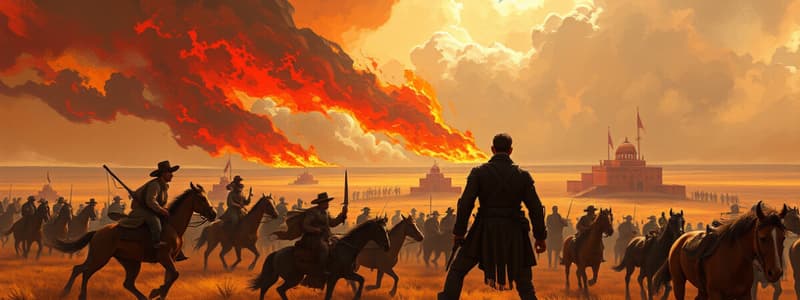Podcast
Questions and Answers
What was the primary issue causing conflict in Bleeding Kansas?
What was the primary issue causing conflict in Bleeding Kansas?
- The choice between allowing or prohibiting slavery (correct)
- Land ownership rights
- Economic disputes between settlers
- Immigration policies
What significant legislation facilitated the tensions in Kansas by allowing popular sovereignty?
What significant legislation facilitated the tensions in Kansas by allowing popular sovereignty?
- The Missouri Compromise
- The Homestead Act
- The Compromise of 1850
- The Kansas-Nebraska Act (correct)
Which group was known for its violent tactics in support of slavery during the conflict?
Which group was known for its violent tactics in support of slavery during the conflict?
- Border Ruffians (correct)
- Free-Staters
- Unionists
- Abolitionists
What event symbolized the intensity of the slavery debate in Washington during this time?
What event symbolized the intensity of the slavery debate in Washington during this time?
How did the election of Abraham Lincoln in 1860 affect Kansas's status regarding slavery?
How did the election of Abraham Lincoln in 1860 affect Kansas's status regarding slavery?
Flashcards are hidden until you start studying
Study Notes
Bleeding Kansas Overview
- Bleeding Kansas refers to violent conflicts in the 1850s in the territory that became Kansas.
- The primary issue was whether Kansas would permit or prohibit slavery.
Key Legislation
- The Kansas-Nebraska Act was passed in 1854, allowing for popular sovereignty.
- Settlers moved to Kansas to influence the decision on slavery, leading to significant conflict.
Pro-Slavery and Anti-Slavery Factions
- Pro-slavery supporters, known as "Border Ruffians" from Missouri, committed violent acts such as murder, arson, theft, and kidnapping.
- Anti-slavery settlers, called "Free-Staters," retaliated with their own acts of violence.
National Tensions
- Violence surrounding the Kansas issue extended to Congress, illustrated by Preston Brooks attacking Senator Charles Sumner with a cane.
- The conflict highlighted the growing tensions over slavery in the United States.
Political Consequences
- The fierce debate over slavery peaked during the 1850s, contributing to the political climate leading to the Civil War.
- Abraham Lincoln's election in 1860 prompted Southern states to consider secession from the Union.
Kansas Admission
- Kansas achieved statehood as a free state in January 1861.
- The absence of Southern politicians in Washington facilitated Kansas's admission without opposition.
Studying That Suits You
Use AI to generate personalized quizzes and flashcards to suit your learning preferences.




